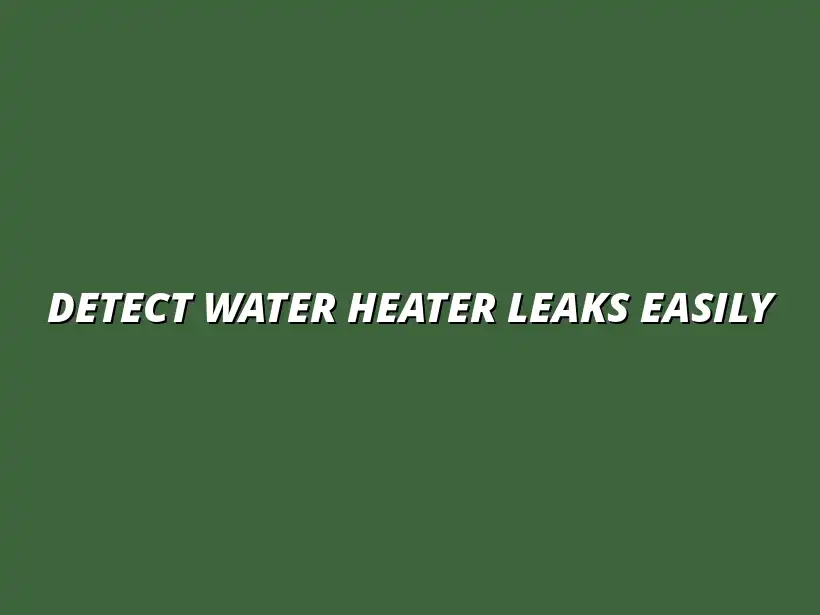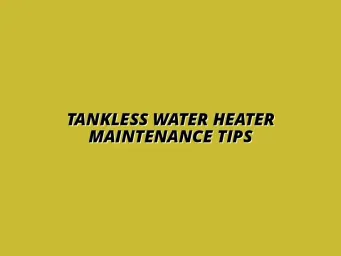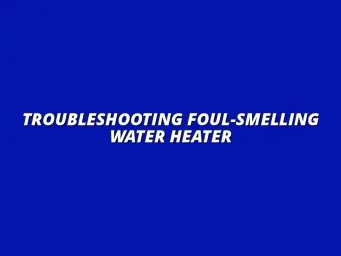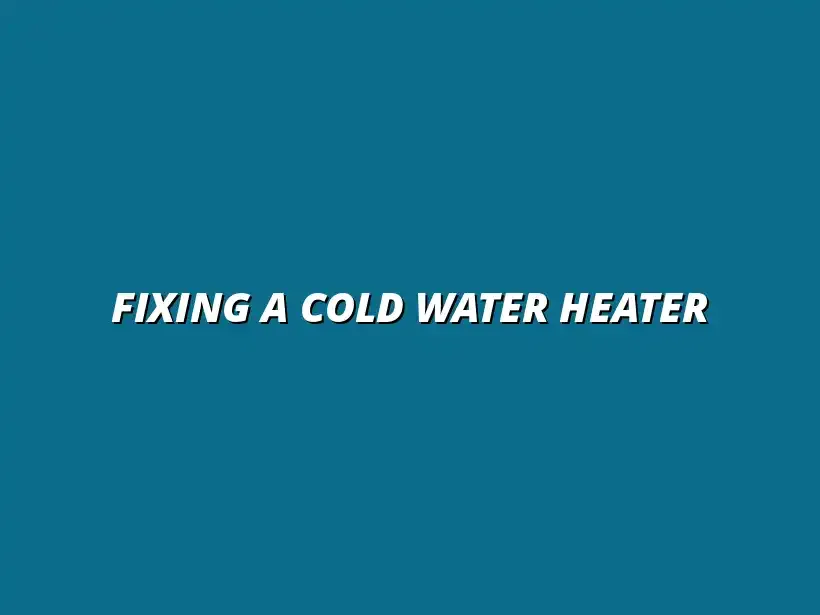
Detect Water Heater Leaks Easily
Understanding Water Heater Functionality and Common Issues
Water heaters are essential appliances in our homes, providing us with hot water for bathing, cooking, and cleaning. Understanding how they work can help us identify issues before they escalate. In this section, we’ll explore the various types of water heaters, their mechanisms, and common signs of wear and tear that could indicate a need for maintenance.
Overview of Water Heater Types and Their Mechanisms
Water heaters primarily come in two types: electric and gas. Each type has its own method of heating water and specific features that can affect efficiency and performance. Knowing these differences can guide homeowners in selecting the right water heater for their needs.
Electric vs. Gas Water Heaters: Key Differences
Electric water heaters use heating elements powered by electricity to warm the water. On the other hand, gas water heaters rely on natural gas or propane. Here are some key differences:
- Energy Source: Electric heaters use electricity, while gas heaters rely on gas fuel.
- Heating Speed: Gas heaters typically heat water faster than electric ones.
- Installation Costs: Electric heaters are often cheaper to install compared to gas heaters.
- Efficiency: Electric heaters can be more efficient in certain setups, but gas heaters can have lower operating costs.
How Water Heaters Operate: The Basics
The operation of water heaters is relatively straightforward. Water flows through the heater, where it is heated and then stored until needed. For electric models, heating elements warm the water, while gas models use a burner at the bottom of the tank. It’s essential to understand these operations to troubleshoot basic problems.
Additionally, both types typically include a thermostat to regulate temperature, ensuring the water stays hot for your needs. Regular checks on these components can help maintain efficiency and prolong the lifespan of your water heater. For more information on maintaining your water heater efficiently, check out this helpful guide: Maintain Your Water Heater Efficiently.
Signs of Wear and Tear in Water Heaters
Just like any appliance, water heaters experience wear and tear over time. Recognizing the signs early can save you from costly repairs or replacements down the line. Some common indicators can alert you to potential issues that need immediate attention.
Common Indicators of Wear in Water Heaters
Here are several signs that your water heater may be wearing down:
- Rust or Corrosion: Look for rust on the tank, which indicates deterioration.
- Unusual Noises: Clanking or popping sounds can suggest sediment buildup.
- Water Temperature Fluctuations: Inconsistent temperatures can signal a failing thermostat.
- Leaks: Puddles around the base of the heater often indicate potential leaks. Learning how to fix a leaky faucet can help prevent some water issues.
Understanding the Lifespan of Water Heaters
Most water heaters have a lifespan of about 8 to 12 years. However, this can vary based on usage, maintenance, and the type of heater. Regular maintenance can significantly extend this lifespan, preventing major issues from cropping up too soon.
It’s a good practice to keep track of your water heater’s age and be attentive to any warning signs. If you notice a leak, understanding water heater leak causes and fixes is crucial. If your heater is nearing the end of its lifespan and showing signs of wear, it may be time to consider a replacement before a complete breakdown occurs.
Importance of Regular Maintenance for Longevity
Regular maintenance is crucial for keeping your water heater running efficiently and prolonging its lifespan. Just like a car, your water heater needs routine checks to ensure all parts are functioning properly. By adopting a proactive approach, you can avoid unexpected breakdowns and costly repairs.
Benefits of Routine Checks on Your Water Heater
Performing regular maintenance on your water heater offers several advantages:
- Enhanced Efficiency: Regular checks help maintain optimal performance and energy efficiency.
- Extended Lifespan: Timely maintenance can significantly extend the life of your heater.
- Cost Savings: Preventing major issues can save you money on repairs and utility bills.
How Preventative Maintenance Can Save Money
Preventative maintenance not only enhances performance but also translates into savings. By addressing minor issues before they escalate, you can avoid the higher costs associated with major repairs or premature replacements. Simple steps like flushing the tank and checking connections can make a big difference! Annual inspections are highly recommended; find tips for annual water heater inspection.
Incorporating routine maintenance into your household schedule can be an easy yet effective way to ensure your water heater serves you well for years to come.
Addressing Frequently Asked Questions about Water Heater Maintenance
Water heater maintenance can raise many questions, especially for those unfamiliar with the ins and outs of these essential household appliances. Regular care is crucial to ensuring your water heater operates efficiently and lasts longer. Below, I’ll tackle some common queries regarding water heater leaks and maintenance tips.
Common Queries Regarding Water Heater Leaks
One of the biggest concerns homeowners face is dealing with water heater leaks. It's vital to know what steps to take if you discover a leak. The prompt action you take can save you from extensive damage and costly repairs!
What Should I Do If I Find a Leak?
If you notice water pooling around your water heater, here’s what you should do immediately:
- Turn Off the Power: For electric heaters, switch off the breaker; for gas heaters, turn off the gas supply.
- Shut Off the Water Supply: Locate the cold water shut-off valve and close it to prevent more water from entering the tank.
- Drain the Tank: If the leak is significant, drain the tank to minimize water damage in your home.
- Call a Professional: It’s best to consult a plumber to assess the situation and recommend repairs. For plumbing services in Birmingham, consider checking out Plumber in Billesley, Birmingham.
How Can I Prevent Future Leaks in My Water Heater?
Preventing leaks is all about proactive maintenance. Here are some tips to keep your water heater in top shape and avoid leaks:
- Inspect connections and pipes regularly for signs of wear or corrosion.
- Flush your water heater at least once a year to remove sediment buildup.
- Check the temperature and pressure relief valve routinely to ensure it's functioning correctly.
- Replace any damaged or worn parts as soon as possible to prevent future issues.
Maintenance Tips for Extending the Life of Your Water Heater
Regular maintenance is key to extending the lifespan of your water heater and keeping it running efficiently. Simple steps can make a big difference in performance. Plus, they can help you avoid expensive repairs down the line! Don't forget the importance of essential kitchen plumbing maintenance tips to avoid potential problems.
Importance of Flushing Your Water Heater Regularly
Flushing your water heater is a crucial task that shouldn’t be overlooked. Doing so helps remove sediment and mineral buildup, which can cause problems in the long run. Here’s why you should make flushing a priority:
- Improves efficiency by allowing the heater to work more effectively.
- Extends the lifespan of the unit by preventing corrosion and damage.
- Ensures hotter water and better pressure, enhancing your overall experience.
When to Schedule Professional Inspections and Repairs
While DIY maintenance is great, there are times when it's wise to call in the pros. Regular inspections can identify potential problems before they become significant issues. Here are some recommended times to schedule a professional service:
- Every 1-3 years for routine inspections, depending on the age of your water heater.
- If you notice unusual noises, leaks, or temperature inconsistencies.
- Before any major changes, like relocating the heater or replacing it. Addressing a clogged bathroom drain can prevent further issues.
Final Thoughts on Maintaining Your Water Heater
Taking care of your water heater is essential for ensuring its longevity and efficiency. By staying informed and proactive, you can catch issues early and maintain optimal performance. Knowledge is power when it comes to home maintenance!
The Value of Staying Proactive with Water Heater Care
Being proactive means monitoring your water heater regularly for signs of wear and tear. Not only does this help prevent leaks, but it also allows you to address minor issues before they escalate. Remember, a little maintenance goes a long way!
Summary of Key Signs to Monitor
Here’s a quick recap of signs you should keep an eye out for:
- Unusual noises coming from the tank.
- Visible rust or corrosion on the heater.
- Water pooling around the base.
- Fluctuating water temperatures.
Call to Action: Regular Maintenance Checks for Optimal Performance
Now that you’re equipped with this information, it’s time to take action! Schedule regular maintenance checks to keep your water heater in top shape. A well-maintained water heater not only saves you money but also ensures you have hot water when you need it!




